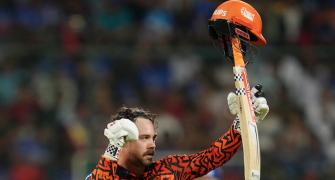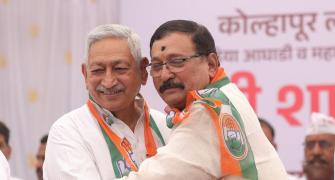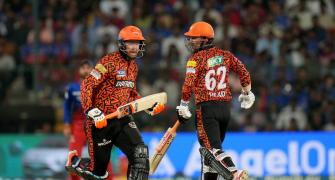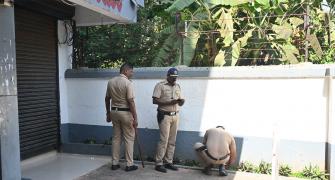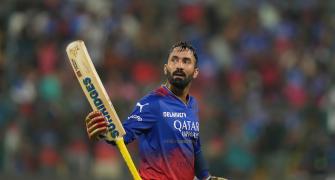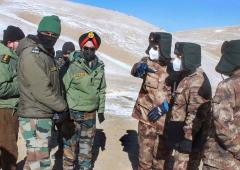Well-known thinker and editor-in-chief of Covert magazine, MJ Akbar has taken up the issue seriously. Since November 27, Akbar has refused to appear on BBC to speak about the Mumbai attacks.
Many British politicians have also taken up the issue with the BBC management. Steve Pound,a British Parliamentarian who represents North Ealing, has issued a strong statement against BBC's biased policy by saying that it was "the worst sort of mealy-mouthed posturing."
Akbar, had gone a step ahead and has written a strongly-worded e-mail to Richard Porter, head of Content, BBC World News. On December 6, Akbar wrote to Porter that, "I just want to let you know that after decades of friendship and association with the BBC, I refused to give an interview to the BBC over the terrorist outrage in Mumbai. The reason is simple: I am appalled, astonished, livid at your inability to describe the events in Mumbai as the work of terrorists. You have called them 'gunmen' as if they were hired security guards on a night out."
Akbar further argued that, "When Britain finds a group of men plotting in a home laboratory your government has no hesitation in creating an international storm, and the BBC has no hesitation in calling them terrorists. When nearly two hundred Indian lives are lost, you cannot find a word in your dictionary more persuasive than 'gunmen'.
Akbar articulated many Indian fans of the BBC when he said," You are not only pathetic, but you have become utterly biased in your reporting. Since we in India believe in freedom of the press, we can do no more than protest, but let me tell you that your credibility, created over long years by fearless and independent journalists like Mark Tully (I am privileged to describe him as a friend), is in tatters and those tatters will not be patched as long as biased non-journalists like you and your superiors are in charge of decisions. Shame on you and your kind."
Akbar's e-mail was not ignored by BBC. A courteous and very British response did arrive in his mailbox on December 11. Porter had argued that, "The guidelines we issue to staff are very clear-we do not ban the use of the word terrorist, but our preference is to use an alternative form of words. There is a judgement inherent in the use of the word, which is not there when we are more precise with our language. "Gunman", or "killer", or "bomber", is an accurate description which does not come with any form of judgement. However, the word is not banned, and is frequently used on our output-usually when attributed to people. I heard it being used on numerous occasions during our coverage from Mumbai." BBC staffers have guidelines which are a public document
Without going into specifics Porter claimed, "There is no inconsistency in the way the BBC has reported the attacks in Mumbai, compared to what we have done with events in the UK. If we are to be serious about upholding our policy, then we cannot make a distinction between events in any country."
In India most critics have pointed out that how BBC termed the July 7, 2005 attackers in London as "terrorists" without hesitation. While in case of Mumbai they used "gunmen" and at odd places "suspected terrorist."
However, Porter, journalist of 27 years standing, argues, "This policy is the opposite of bias...but it is a difficult one to uphold and is the subject of many discussions within BBC headquarters. Clearly we had the discussion once again in the wake of the Mumbai attacks--and comments like yours are taken very seriously by my editorial colleagues."
In short, the BBC wants its viewers and readers to use their own brains. Porter wrote, ' I believe those audiences can make their own mind up about the people who carried out the attacks in Mumbai and don't need us to give them any label to reach that judgement."
Obviously, Akbar has not accepted these arguments. After thanking "courteousness" of Porter's e-mail to him Akbar asked, " But your response does not answer my question: how does the BBC find it easy to define a terrorist when trains and buses in London are attacked, but must slide towards "non-judgmental" definitions when there is a blatant and murderous display of terrorism in Mumbai? Are you serious when you say that you leave it to audiences to make up their own minds? Then why did you not leave it to audiences to make up their own minds after 9/11? "
Akbar, wrote, "I assume the makers of BBC policies, such as they are, understand English. There is a clear distinction between gunmen and terrorists. Criminals use guns, and can be called gunmen; criminals use guns in the service of crime. Terrorists use guns and worse in the random killing of innocents in pursuit of a political agenda or personal agenda. The killers who came to Taj and Oberoi and the Chatrapati Shivaji railway station and a home where Jewish people lived, did not come to steal art, or railway property or money. They came with the declared purpose of murder and mayhem."
When Akbar was in London, the tabloids were full of headlines about young people being knifed. Akbar says , " that was crime committed by "knifemen". Al Capone was a "gunman" and I am sure the East End of your city once used to produce "gunmen" who committed crimes.
Akbar told Porter, " It is a shame that the BBC cannot see the difference between a criminal and a terrorist, and chooses in fact to protect the terrorist by giving him the camouflage of a criminal. This is not a matter of semantics. Terrorists are always happy to fudge the definition."


